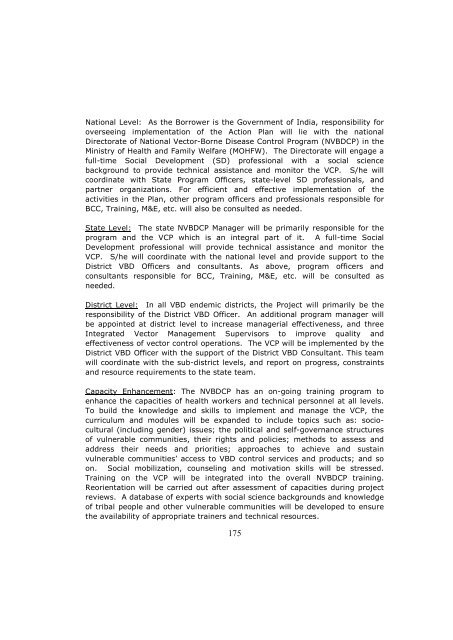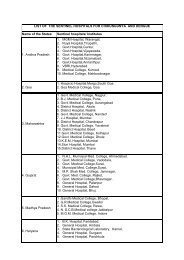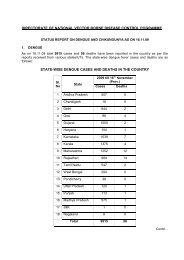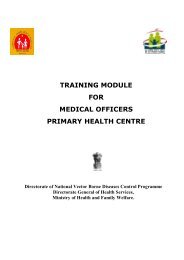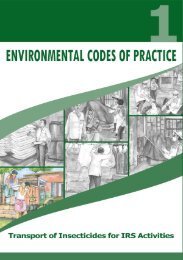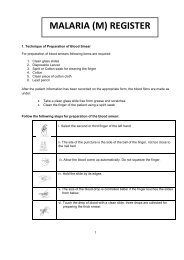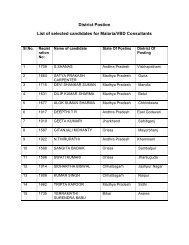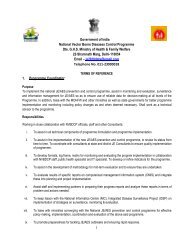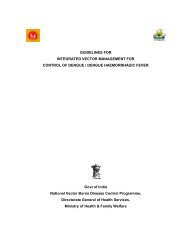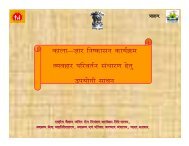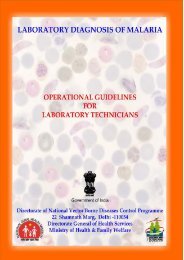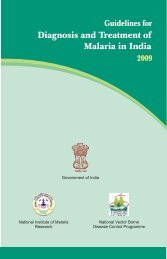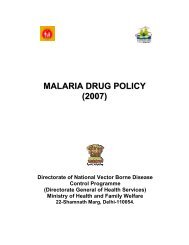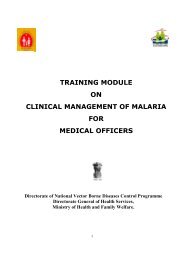National Project Implementation Plan - NVBDCP
National Project Implementation Plan - NVBDCP
National Project Implementation Plan - NVBDCP
Create successful ePaper yourself
Turn your PDF publications into a flip-book with our unique Google optimized e-Paper software.
<strong>National</strong> Level: As the Borrower is the Government of India, responsibility for<br />
overseeing implementation of the Action <strong>Plan</strong> will lie with the national<br />
Directorate of <strong>National</strong> Vector-Borne Disease Control Program (<strong>NVBDCP</strong>) in the<br />
Ministry of Health and Family Welfare (MOHFW). The Directorate will engage a<br />
full-time Social Development (SD) professional with a social science<br />
background to provide technical assistance and monitor the VCP. S/he will<br />
coordinate with State Program Officers, state-level SD professionals, and<br />
partner organizations. For efficient and effective implementation of the<br />
activities in the <strong>Plan</strong>, other program officers and professionals responsible for<br />
BCC, Training, M&E, etc. will also be consulted as needed.<br />
State Level: The state <strong>NVBDCP</strong> Manager will be primarily responsible for the<br />
program and the VCP which is an integral part of it. A full-time Social<br />
Development professional will provide technical assistance and monitor the<br />
VCP. S/he will coordinate with the national level and provide support to the<br />
District VBD Officers and consultants. As above, program officers and<br />
consultants responsible for BCC, Training, M&E, etc. will be consulted as<br />
needed.<br />
District Level: In all VBD endemic districts, the <strong>Project</strong> will primarily be the<br />
responsibility of the District VBD Officer. An additional program manager will<br />
be appointed at district level to increase managerial effectiveness, and three<br />
Integrated Vector Management Supervisors to improve quality and<br />
effectiveness of vector control operations. The VCP will be implemented by the<br />
District VBD Officer with the support of the District VBD Consultant. This team<br />
will coordinate with the sub-district levels, and report on progress, constraints<br />
and resource requirements to the state team.<br />
Capacity Enhancement: The <strong>NVBDCP</strong> has an on-going training program to<br />
enhance the capacities of health workers and technical personnel at all levels.<br />
To build the knowledge and skills to implement and manage the VCP, the<br />
curriculum and modules will be expanded to include topics such as: sociocultural<br />
(including gender) issues; the political and self-governance structures<br />
of vulnerable communities, their rights and policies; methods to assess and<br />
address their needs and priorities; approaches to achieve and sustain<br />
vulnerable communities’ access to VBD control services and products; and so<br />
on. Social mobilization, counseling and motivation skills will be stressed.<br />
Training on the VCP will be integrated into the overall <strong>NVBDCP</strong> training.<br />
Reorientation will be carried out after assessment of capacities during project<br />
reviews. A database of experts with social science backgrounds and knowledge<br />
of tribal people and other vulnerable communities will be developed to ensure<br />
the availability of appropriate trainers and technical resources.<br />
175


